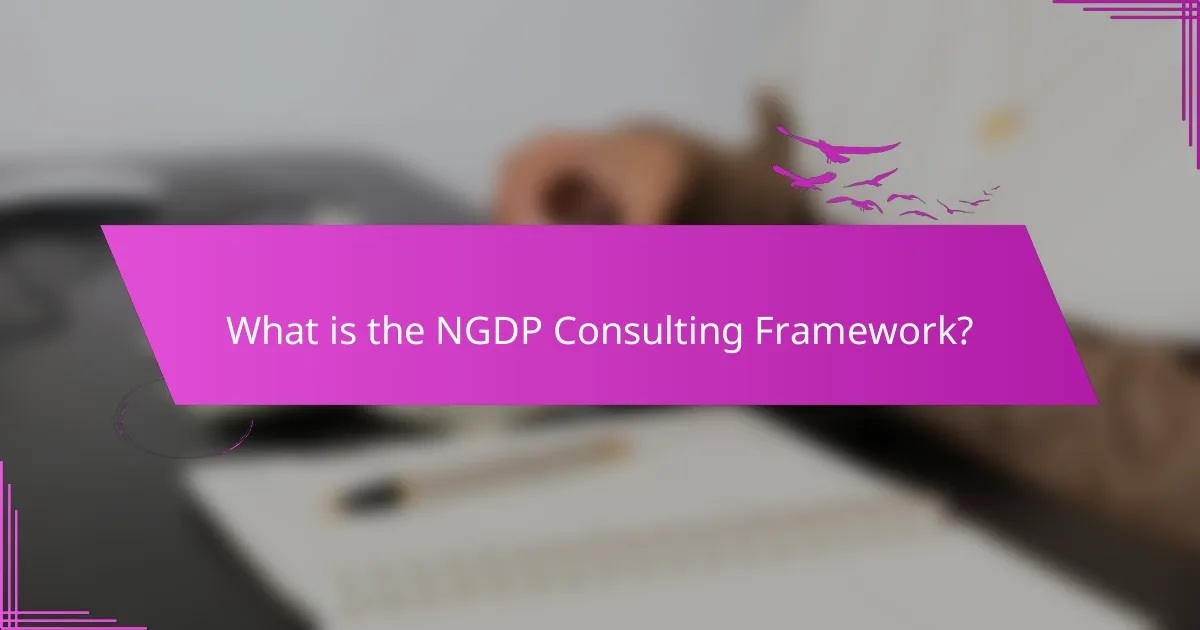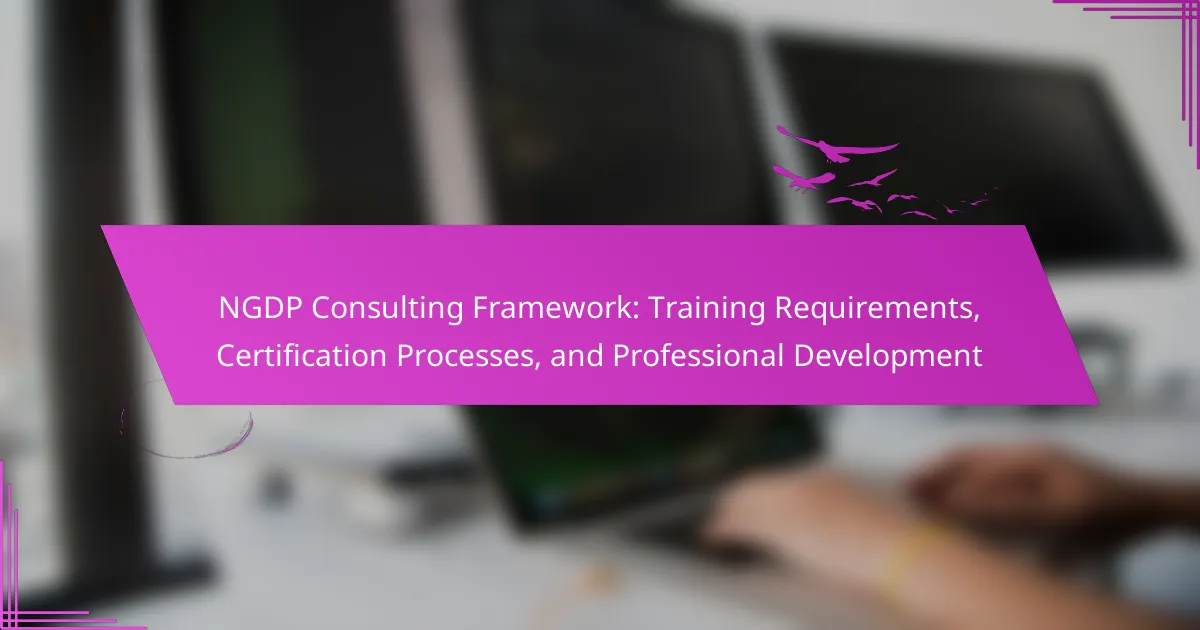
What is the NGDP Consulting Framework?
The NGDP Consulting Framework is a structured approach designed for consulting in the field of organizational development. It focuses on guiding consultants through a series of stages to enhance effectiveness. The framework includes assessment, strategy formulation, implementation, and evaluation phases. Each phase is supported by specific methodologies and tools. This ensures that consultants can address client needs systematically. The framework is widely recognized for its applicability across various industries. It aims to improve organizational performance and client satisfaction.
How does the NGDP Consulting Framework operate?
The NGDP Consulting Framework operates by providing a structured approach to professional development in consulting. It emphasizes core competencies required for effective consulting practices. The framework includes specific training modules designed to enhance skills in areas such as communication, problem-solving, and strategic thinking. Each module is tailored to address real-world consulting scenarios. Participants engage in hands-on projects that reinforce their learning. The framework also incorporates assessment tools to evaluate progress and proficiency. Feedback mechanisms are in place to ensure continuous improvement. This structured approach supports both individual growth and organizational success in consulting.
What are the key components of the NGDP Consulting Framework?
The key components of the NGDP Consulting Framework include strategic planning, stakeholder engagement, and performance evaluation. Strategic planning involves defining goals and objectives for consulting projects. Stakeholder engagement focuses on collaboration with clients and relevant parties. Performance evaluation assesses the effectiveness of the consulting services provided. These components work together to ensure successful project outcomes and client satisfaction.
How do these components interact within the framework?
The components of the NGDP Consulting Framework interact through a structured process. Training requirements establish foundational knowledge necessary for certification. Certification processes validate this knowledge and ensure competency in consulting practices. Professional development enhances skills and keeps consultants updated with industry trends. Each component feeds into the next, creating a continuous cycle of learning and validation. For example, ongoing professional development may lead to advanced certifications. This interaction ensures that consultants maintain high standards of practice. Ultimately, the synergy among these components fosters a competent consulting workforce.
What training requirements are necessary for the NGDP Consulting Framework?
The NGDP Consulting Framework requires specific training to ensure effective implementation. Participants must complete foundational courses on consulting principles. Advanced training sessions focus on strategic thinking and problem-solving skills. Workshops on stakeholder engagement are also essential. Additionally, practical experience through case studies is required. Certification exams validate the acquired knowledge and skills. Continuous professional development is encouraged to stay updated with industry trends. These requirements ensure consultants are well-prepared for real-world challenges.
What foundational skills are needed for effective training?
Effective training requires foundational skills such as communication, organization, and adaptability. Communication skills enable trainers to convey information clearly. Organization skills help in structuring training sessions effectively. Adaptability allows trainers to respond to diverse learning styles. Research shows that trainers with strong communication skills can improve participant engagement by 30%. Additionally, well-organized training sessions lead to a 25% increase in knowledge retention. Adaptability in trainers has been linked to improved learner satisfaction, enhancing overall training effectiveness.
How is training structured within the framework?
Training within the NGDP Consulting Framework is structured through a tiered approach. Each tier focuses on specific competencies and skills required for effective consulting. The framework includes foundational training, advanced skill development, and specialized certifications. Foundational training covers essential consulting principles and methodologies. Advanced skill development enhances analytical and strategic thinking abilities. Specialized certifications validate expertise in niche areas of consulting. This structured approach ensures comprehensive skill acquisition and professional growth. The framework is designed to support continuous learning and adaptation to industry changes.
What certification processes are involved in the NGDP Consulting Framework?
The NGDP Consulting Framework involves several certification processes. These processes include initial training, assessment of competencies, and ongoing professional development. Participants must complete a structured training program that covers key consulting skills. After training, candidates undergo a competency assessment to evaluate their knowledge and practical abilities. Successful candidates receive certification, which validates their expertise in the framework. Additionally, certified consultants are required to participate in continuous learning to maintain their certification status. This ensures they stay updated with industry standards and practices.
What are the steps to achieve certification?
To achieve certification, follow these steps: First, complete the required training program. This program typically covers essential knowledge and skills. Next, gather necessary documentation, including proof of training and any prerequisites. After that, submit your application to the certifying body. Pay any associated fees at this stage. Subsequently, prepare for the certification exam by studying relevant materials. Take the exam on the scheduled date. Finally, receive your certification upon passing the exam. This process ensures that candidates meet the established standards for certification.
What criteria are used to evaluate candidates for certification?
Candidates for certification are evaluated based on specific criteria. These criteria typically include educational qualifications, relevant work experience, and performance on assessments. Educational qualifications may require a degree or equivalent training in a related field. Relevant work experience often includes a minimum number of years in a specific role or industry. Performance assessments usually involve passing written exams or practical evaluations. These criteria ensure that candidates possess the necessary knowledge and skills for certification.

How does professional development fit into the NGDP Consulting Framework?
Professional development is integral to the NGDP Consulting Framework. It enhances the skills and competencies of consultants. This framework emphasizes continuous learning and adaptation. Professional development activities include workshops, training sessions, and mentorship programs. These activities align with the framework’s goal of fostering expertise. The NGDP Consulting Framework also mandates specific training requirements for certification. This ensures that consultants remain updated with industry standards. Thus, professional development is a key component that supports the overall effectiveness of the framework.
What opportunities for professional development does the framework provide?
The NGDP Consulting Framework provides various opportunities for professional development. It includes structured training programs designed to enhance skills. These programs cover essential consulting methodologies and best practices. Additionally, the framework offers certification processes to validate expertise. Professionals can engage in workshops and seminars to gain practical knowledge. Networking opportunities with industry experts are also available. Continuous learning resources are provided to keep skills updated. This comprehensive approach supports career growth and advancement in the consulting field.
How can individuals leverage these opportunities for career growth?
Individuals can leverage opportunities for career growth by actively engaging in training programs. Participating in structured training enhances skills and knowledge relevant to current job markets. Certification processes further validate expertise and improve employability. Networking during training events opens doors to new professional connections. Seeking mentorship within the framework provides guidance and insights from experienced professionals. Additionally, applying learned skills in real-world scenarios solidifies knowledge and boosts confidence. Continuous professional development ensures individuals remain competitive in their fields. These strategies collectively contribute to upward mobility in careers.
What are the benefits of pursuing professional development within the NGDP Consulting Framework?
Pursuing professional development within the NGDP Consulting Framework enhances skills and knowledge. This framework provides structured training that aligns with industry standards. Participants gain access to expert-led workshops and resources. Networking opportunities with professionals in the field are available. This engagement fosters collaboration and knowledge sharing. Enhanced career prospects result from the acquired competencies. Organizations benefit from improved employee performance and innovation. The framework supports continuous learning, ensuring relevance in a changing market.
How does ongoing education enhance consulting skills?
Ongoing education enhances consulting skills by providing updated knowledge and techniques. It allows consultants to stay informed about industry trends and best practices. This continual learning process fosters critical thinking and problem-solving abilities. As a result, consultants can offer innovative solutions to clients. Furthermore, ongoing education helps build credibility and trust with clients. It demonstrates a commitment to professional growth and excellence. Research shows that professionals who engage in lifelong learning are more adaptable to change. This adaptability is crucial in the fast-paced consulting environment.
What impact does professional development have on career advancement?
Professional development significantly enhances career advancement opportunities. It equips individuals with updated skills and knowledge relevant to their field. This increased competency often leads to greater job performance. Higher job performance can result in promotions and salary increases. Research indicates that employees who engage in professional development are 15% more likely to receive a promotion. Additionally, professional development fosters networking opportunities. Building professional relationships can open doors to new career prospects. Overall, investing in professional development yields tangible benefits for career progression.

What are the best practices for engaging with the NGDP Consulting Framework?
Engaging with the NGDP Consulting Framework effectively requires structured approaches. First, familiarize yourself with the framework’s core principles and methodologies. Understanding these foundational elements is crucial for effective application. Next, participate in training sessions offered through the framework. These sessions provide essential insights and practical skills. Additionally, seek mentorship from experienced consultants within the framework. Mentorship can enhance your learning and application of best practices. Collaborate with peers to share insights and strategies. This collaborative approach fosters a deeper understanding of the framework. Lastly, regularly review and assess your engagement with the framework. Continuous evaluation ensures alignment with best practices and promotes professional growth.
How can professionals effectively prepare for training and certification?
Professionals can effectively prepare for training and certification by establishing a structured study plan. A study plan should include specific goals, timelines, and resources. Identifying key topics relevant to the certification is crucial. Utilizing official study materials and resources provided by the certifying body enhances understanding. Engaging in practice exams helps assess readiness and identify knowledge gaps. Joining study groups fosters collaborative learning and provides support. Scheduling regular review sessions reinforces retention of information. Consistent practice and application of knowledge in real-world scenarios solidifies learning. These methods have been shown to improve success rates in professional certifications.
What resources are available to support preparation efforts?
Resources available to support preparation efforts include training programs, certification courses, and professional development workshops. These resources help individuals gain necessary skills and knowledge. For example, the NGDP Consulting Framework offers structured training modules tailored to various expertise levels. Certification processes validate competencies and enhance credibility in the field. Additionally, professional development workshops provide networking opportunities and insights from industry experts. Access to online platforms and learning materials further supports continuous education. These resources collectively enhance readiness for consulting roles within the NGDP framework.
What common challenges do individuals face in the NGDP Consulting Framework?
Individuals face several common challenges in the NGDP Consulting Framework. One challenge is the complexity of the framework itself, which can be overwhelming for new participants. Many individuals struggle to understand the specific requirements for training and certification. This often leads to confusion regarding the necessary steps to achieve professional development. Another challenge is the time commitment required for training and certification, which can hinder participation. Additionally, individuals may encounter difficulties in accessing resources and support throughout the process. These challenges can ultimately impact their progress and success within the framework.
How can these challenges be overcome for successful outcomes?
Challenges in the NGDP Consulting Framework can be overcome through targeted training and effective certification processes. Implementing comprehensive training programs enhances skills and knowledge. Regular assessments ensure that participants meet required competencies. Providing mentorship fosters professional development and guidance. Utilizing feedback mechanisms improves training effectiveness. Establishing clear certification criteria ensures accountability and standards. Engaging industry experts in training design enhances relevance and applicability. Continuous learning opportunities keep skills updated and aligned with industry trends.
The NGDP Consulting Framework is a structured methodology aimed at enhancing consulting practices in organizational development through defined stages: assessment, strategy formulation, implementation, and evaluation. This article outlines the framework’s core components, including training requirements, certification processes, and opportunities for professional development, emphasizing the importance of continuous learning and skill enhancement. Key aspects such as foundational skills, effective training structures, and the interaction of various components are discussed, providing insights into how consultants can achieve certification and advance their careers within this framework. Additionally, common challenges faced by individuals and strategies for overcoming these obstacles are addressed, ensuring successful outcomes in consulting.
